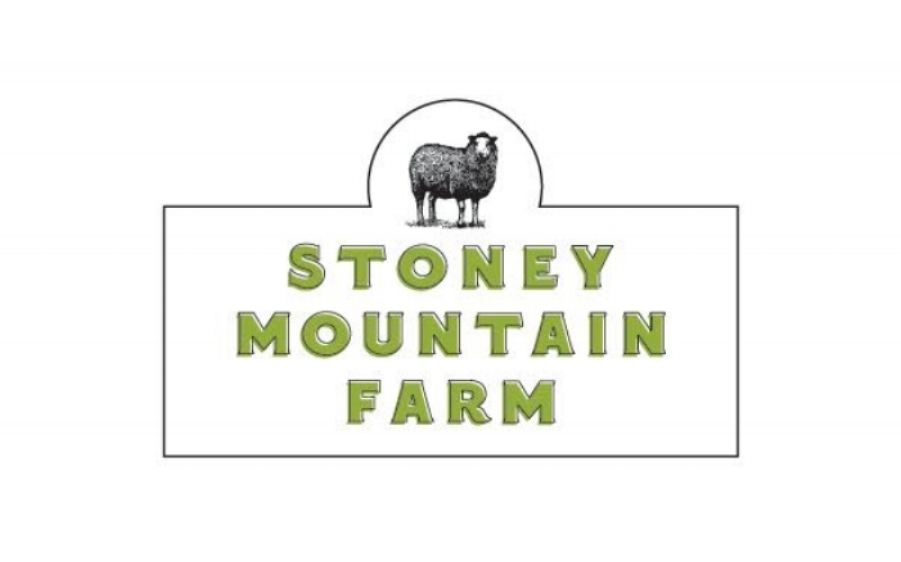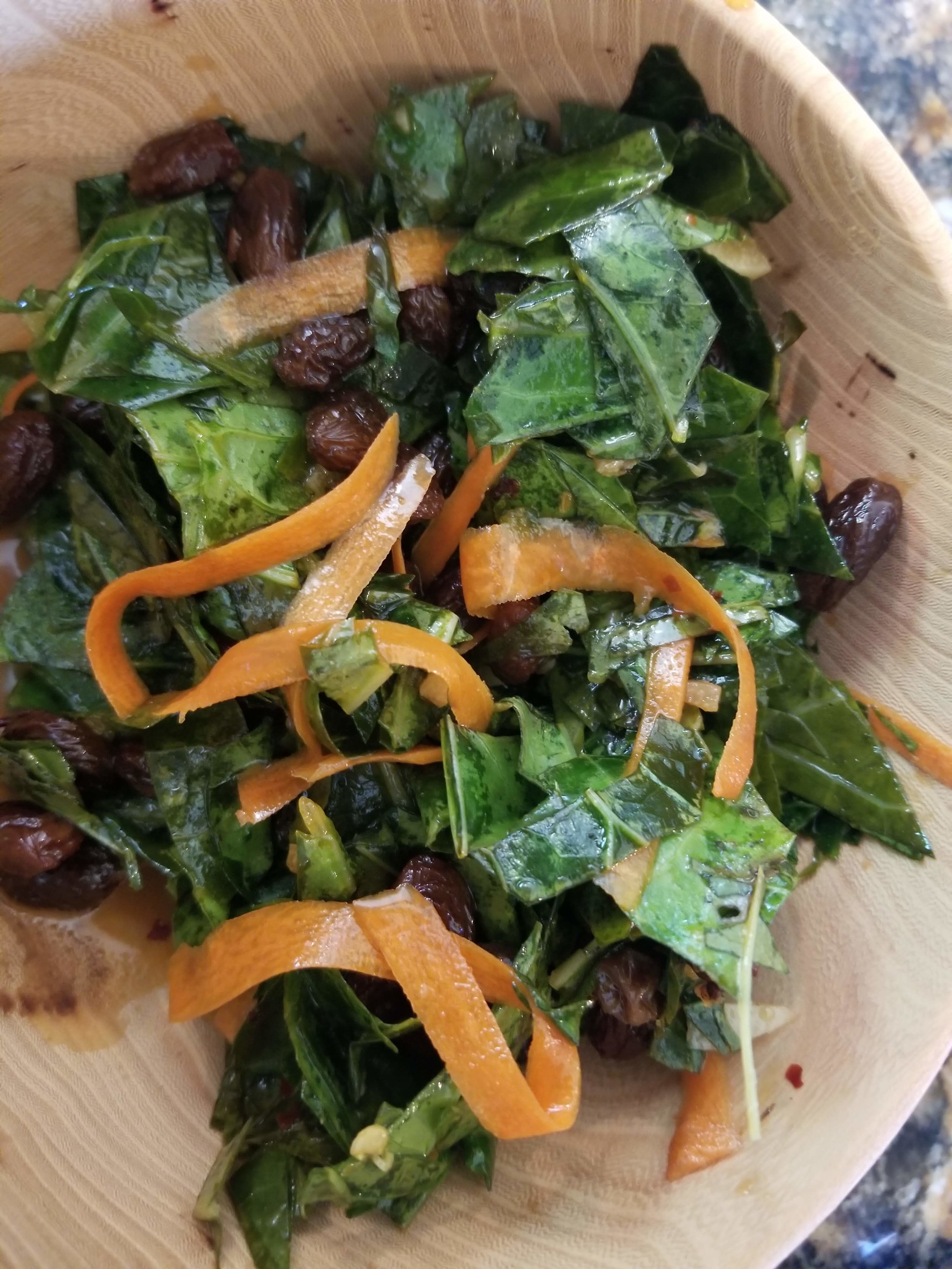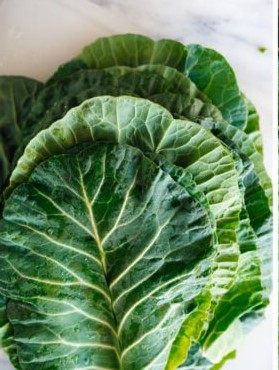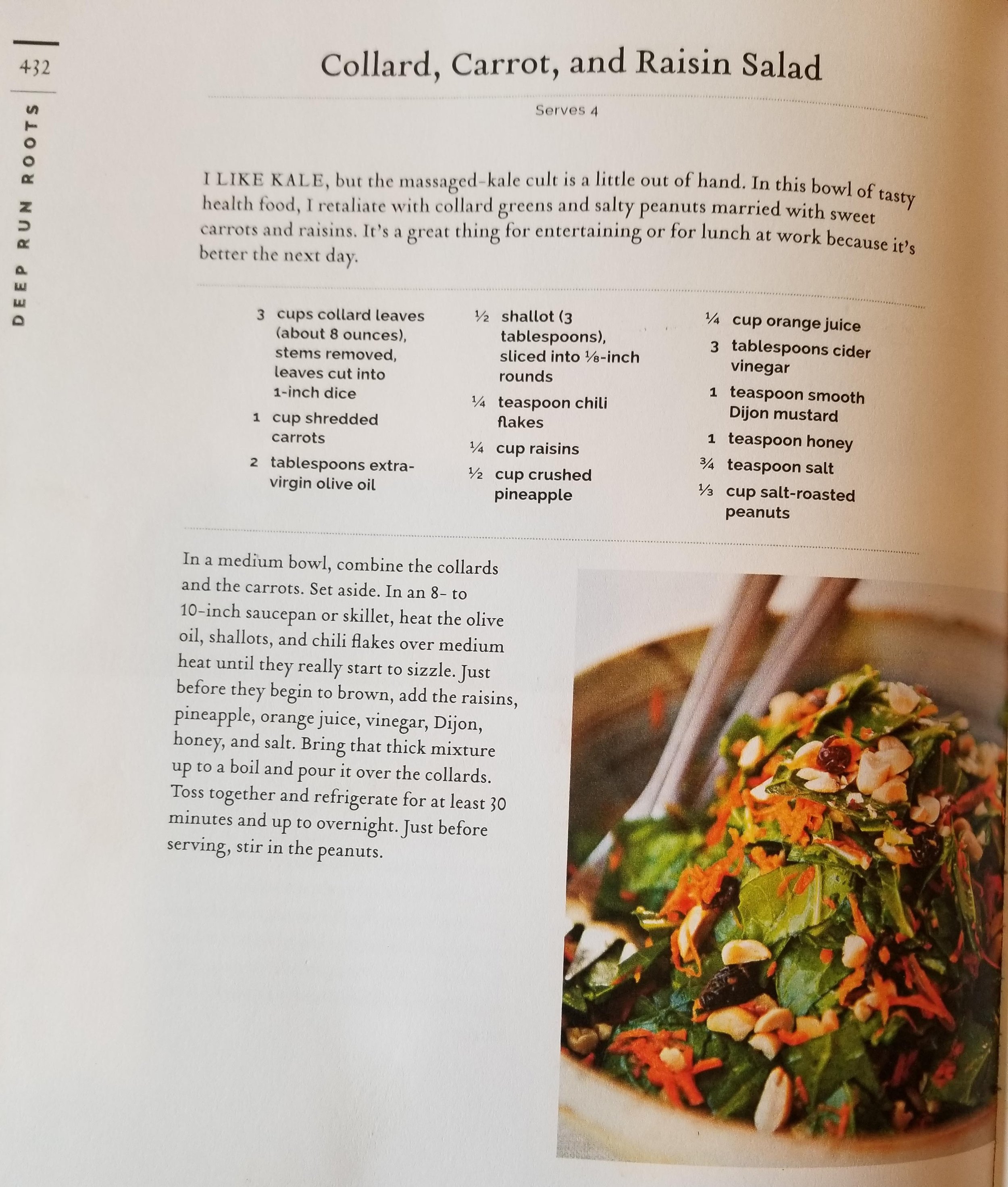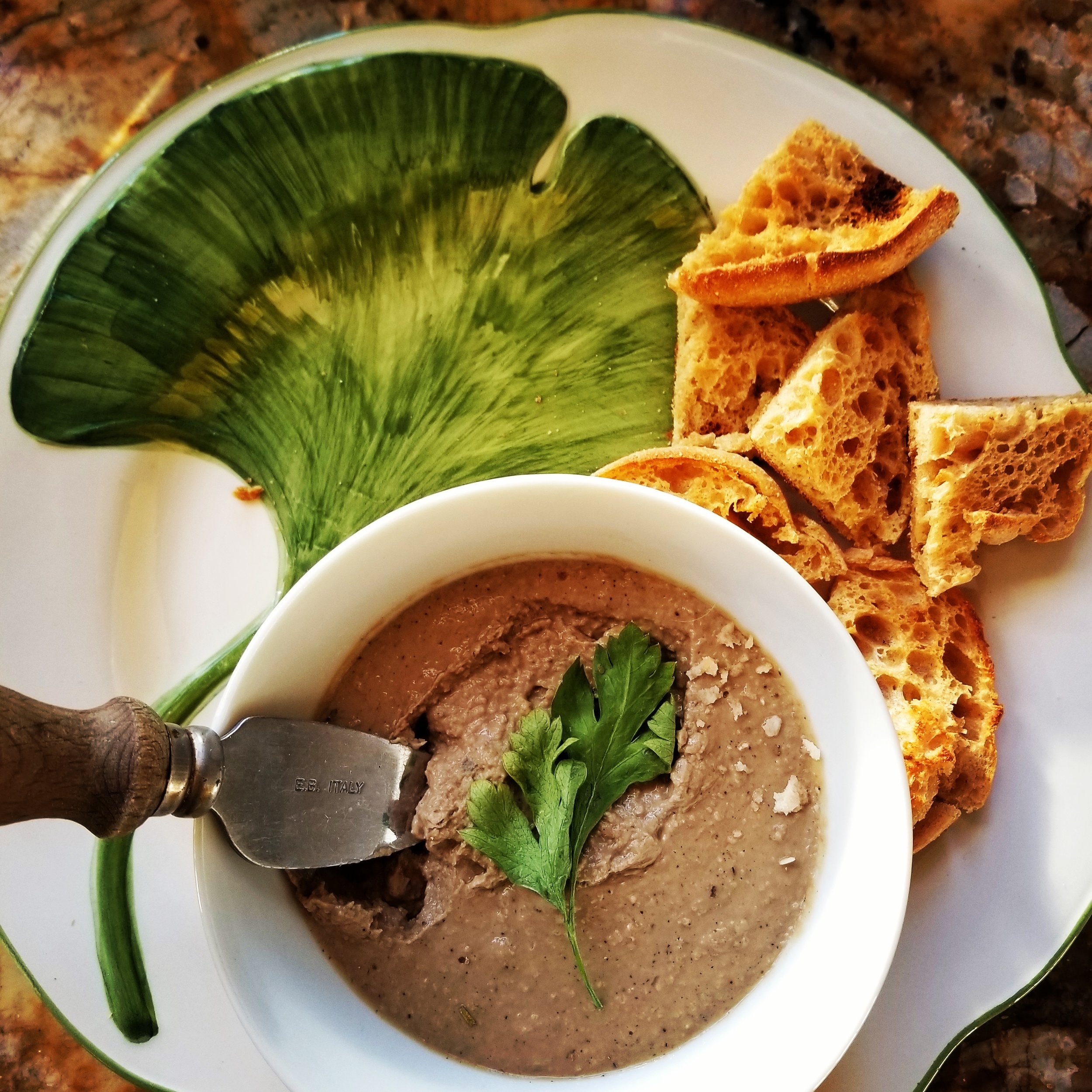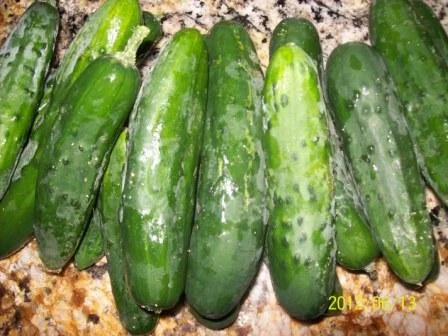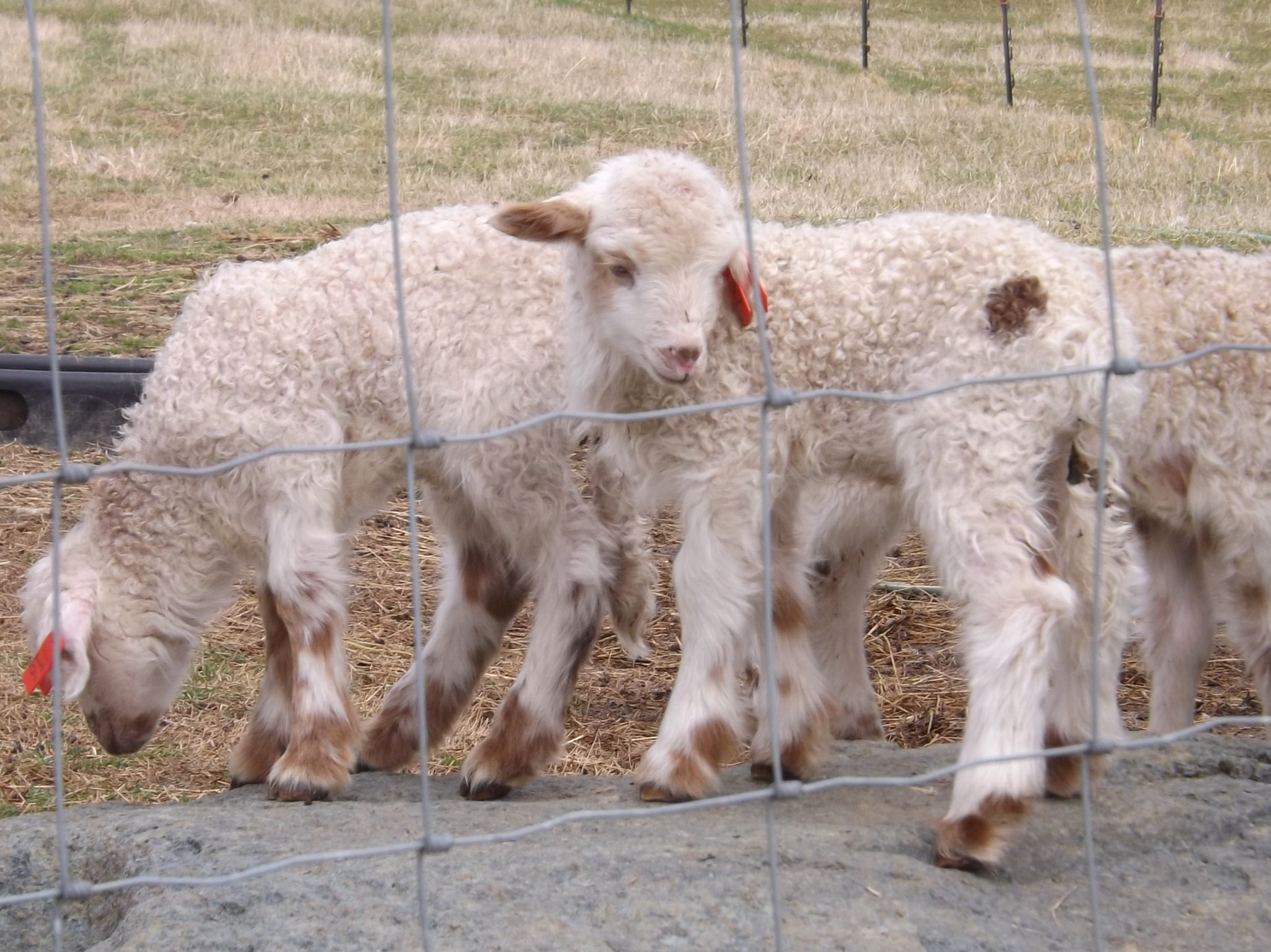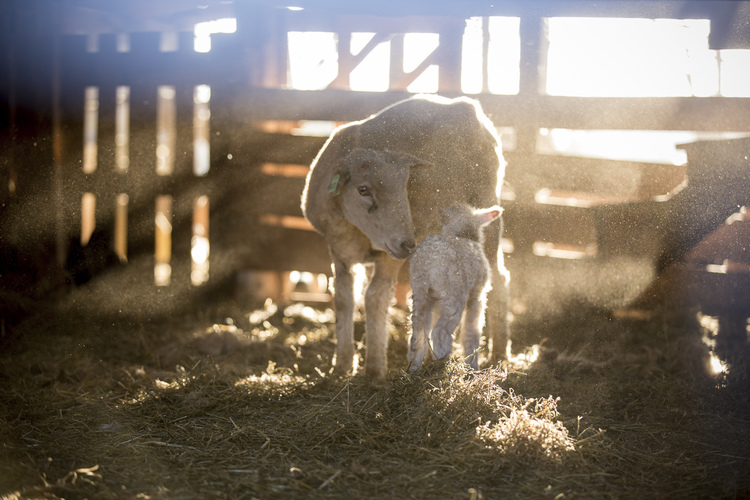
Collard Salad
When I saw this recipe for collard salad the northerner in me was apprehensive. Did I say NORTHERNER? Don’t worry or get confused that this shepherd living and farming in the south is not the person you thought you knew… I am not a true northern but a confused mix of both. Most of my rearing took place in the south. I was after all born in the south. Alas I cannot get too far away from the fact that both my parents were northerners and I spent a lot of my youth in the north. Growing up we ate like northerners most of the time. My mom was a northerner so that’s how we ate. My mom also was adventurous and would be the first to honor any culture so we did eat southern foods from time to time but mostly like a northern transplant might. She DID as so many northern folk do, put sugar in her cornbread, not much but enough to know she could not be a southerner. I have one of her old cookbooks and my story is evidenced by her handwritten “cornbread” recipe on the back cover. Yep, sugar! So in my round about way I’m saying collards are not and never were a common item on any menu in my house. I eat them and enjoy them once a year, New years day.
On one particular Saturday in May at our weekly farmers market I was gifted a bundle of collard greens. Grateful yes. Unsure what I could do; so true. Unable to waste anything =challenged.
Who better to help with this deeply southern food group then Vivian Howard. I luckily own her first cookbook, Deep Run Roots. I journeyed through several of the recipes when I first got the cookbook, everything I tried was good. Her deviled eggs with buttah, blueberry BBQ sauce, and her Party Magnet Cheese ball (as featured in Garden & Gun Mag) all were hits. Anywho, gifted with a bundle of collards I decided to try one of the recipes and ended up choosing the collard salad. What a surprise, what a treat. I usually ALWAYS commit to making a recipe exactly as written the first time but I just did not have pineapple on hand. I did have collards though! The heated dressing wilts and tenderizes and the overnight marinade brings out the wonderful flavors. The greens keep a “green” texture which allows it to be considered a salad I suppose. I honestly say the pineapple was not missed and the idea of it has me a bit confused. Alas, out of my desire to respect all recipes as written I shall try the pineapple next time.
Who knew this southern green staple, collard greens, aka collards could become something other then a slow cooked slippery mass of greens swimming in liquid, aka pot liquor? I didn’t. This ubiquitous bowl of greens, commonly served with cornbread, can be found most anywhere in the south. If not served, they sure know somewhere close you can go get some!
When I saw this recipe for collard salad the northerner in me was apprehensive. Did I say NORTHERNER? No need to worry or get confused that this shepherd living and farming in the south is not the person you thought you knew… I am not a true northern but a confused mix of both. Most of my rearing took place in the south. After all I born in the south. I cannot get too far away from the fact that both my parents were northerners and I spent a lot of my youth in the north. My mom was a northerner so that’s how we ate growing up. My mom also was adventurous and would be the first to honor any culture so we did eat southern foods from time to time but mostly like a northern transplant might. She DID, as so many northern folk do, put sugar in her cornbread, not much but enough to know she could not be a southerner. I have one of her old cookbooks and my story is evidenced by her handwritten “cornbread” recipe on the back cover. Yep, sugar!
So in my round about way I’m saying collards are not and never were a common item on any menu in my house. I eat them and enjoy them once a year, New years day.
On one particular Saturday in May at our weekly farmers market I was gifted a bundle of collard greens. Grateful yes. Unsure what I could do; so true. Unable to waste anything =challenged.
Who better to help with this deeply southern food group then Vivian Howard. I luckily own her first cookbook, Deep Run Roots. I journeyed through several of the recipes when I first got the cookbook, everything I tried was good. Her deviled eggs with buttah, blueberry BBQ sauce, and her Party Magnet Cheese ball (as featured in Garden & Gun Mag) all were hits. Anywho, gifted with a bundle of collards I decided to try one of the recipes and ended up choosing the collard salad. What a surprise, what a treat. I usually ALWAYS commit to making a recipe exactly as written the first time but I just did not have pineapple on hand. I did have collards though! The heated dressing wilts and tenderizes and the overnight marinade brings out the wonderful flavors. The greens keep a “green” texture which allows it to be considered a salad I suppose. I honestly say the pineapple was not missed and the idea of it has me a bit confused. Alas, out of my desire to respect all recipes as written I shall try the pineapple next time.
Shearing Day was not a washout!
Rain or shine, farm chores must go on and sometimes, in spite of the conditions, something wonderful happens.
There are certain farm chores that come with the territory. On a sheep farm one annual task we have is shearing. Most folks shear their sheep annually although some of our sheep need it twice a year.. A great deal of our farms success depends on the wool our sheep provide so it’s an important date on our calendar.
Shearing Day
Regardless, the shearing must be done.
Several years ago we decided to make an event of it and include the public. That’s it, we’ll invite folks that have never had the opportunity to see sheep loose their winter coats. Some folks have never even seen a sheep before. As the annual event has progressed it has turned into quite a big ordeal. Hundreds of folks each year come to the farm to see, learn and enjoy the farm setting.
This year will go down as one we’ll NEVER forget.
Shearing for us always takes place in late February or early March. We plan as far out on the calendar as we can but generally cannot set the date too far in advance because setting that date depends on a few things out of our control. Number ONE, we’re dependent on the shearer. As you might imagine, shearers are not easy to come by. When you find one you like you do your best to work closely with them and develop a relationship you both can depend on. Once you get your shearer to agree to a date all the event planning begins. We cater lunch and offer other activities for folks once they get here. How do we know how many people to plan for? Well we don’t really. We generally go by the previous years attendance and add a buffer. So, we order food ahead. We plan help. We commit to a band. Yes a band; there is something special about sitting on a blanket looking out over a pastoral setting, listening to some musicians pickin’ away.
OK, check, check and check. Everything is in order.
The last thing we’re dependent on is the weather. Yup. Counting on the weather is like tossing a coin in the air. Mother Nature is going to do her thing regardless of how much time, money and effort you’ve invested. Once you’ve set the date (as far in advance as you can for obvious reasons) there is no turning back. We’ve all seen a next days weather forecast change or even sun when Al Roker said rain!
Well 2019 shouldn’t have been a total surprise what with the onslaught of rain we’d had. Weeks before and leading up to the day…the rain did not let up. From the first day the extended 10 day weather forecast is posted on television and smartphones, I am tuning in. First thing each morning even before coffee I am reviewing every weather outlet to see the latest predictions. Thursday, before this years event, they had predicted rain all day. THE SUN CAME OUT! Me, the eternal optimism kept imaging Saturday would be the same. Under my breath I also muttered, “it is going to be what it’s going to be”. I knew we’d have to deal with it.
The caterer called giving us the option to cancel or reduce our quantities. A few of the band members came by to say it was OK if we wanted to cancel. Alas, the event had been advertised and the shearer was coming…THE SHOW MUST GO ON.
Saturday began with more rain then I had seen any day that week, POURING! Even if it stopped before the gates opened we’d have mud galore.
How should we prepare? Would people even come?
Although the attendance was certainly down we had some real troopers out here! No one seemed bothered. Most were fully aware what to expect from the weather. Some learned their water resistant clothing wasn’t as water proof as they thought!. Everyone seemed to enjoy themselves! Everyone understood I couldn’t ‘warm’ it up or move the puddles.
We sheared, we ate, we got wet and shivered a bit together and somehow, in the midst of all the rain and mud I so enjoyed the day with way more folks then I’d anticipated. In many ways, I didn’t realize it was raining until I removed my wet clothes!
I had several memorable interactions.
The interaction I most wanted to share is the young girl and her parents who together had been discovering the world of knitting. They had decided, to buy some wool and take it through the process of washing, carding, spinning and finally knitting. They were picking a freshly shorn fleece to buy and I encouraged them while here to pick a sheep and really connect the wool to the source. The family was able to deliberately pick a sheep that attracted her. They were able to pet the sheep and watch the sheep get shorn. With a tear in she and her mother’s eye they shared with me how that experience touched them! They will always connect with that finished handmade piece in a way that cannot be matched! I learned of the girls grandmother in Switzerland that would be so happy to hear their experience.
I will never forget that experience and I will never forget them!
Win, loose or draw with the days finance report…it doesn’t seem to matter after a day like this!
The life of a sheep!
The connection between a shepherd and her sheep
Gabby
I was in the barn the other day and our eyes locked on each other.
My mind raced back over our years together. I was amazed at the many facets of this pretty gals life here on the farm.
The daughter of Willow, another of our very photographed and storied gals here on the farm. Gabby was born several years ago. A real beauty of a lamb! Shiny black and long strong legs with a very happy bounce that took her about the barn and pastures. One day during barn chores I noticed her mother, Willow, seeming to talk to me, she kept baaing at me and standing in one place. I followed her cue and found Gabby, clearly not feeling well. Her wonderful momma kept nudging her with her nose. Gabby didn’t have the strength to even nurse her mother, which of course was her life blood. Long story short, we almost lost Gabby. After weeks of constant attention and TLC she survived and was soon romping again about the pastures.
As a shepherd you become especially connected to sheep you’ve spent such heart rending time with. Anyways, I always noted a sort of smile on this little girls face (she’ll always be a little girl to me).
The first 18 months of her life she got to enjoy just the frolic! Then at her almost 2nd year of life she had a baby of her own but poor Gabby freaked! Her instinct, so viable in the Navajo breed , brought her to a wooded area to have her lamb. She gave birth with ease. As she stood over her newborn trying to put two and two together my husband John spotted her and went to check on her. She saw him coming. A little freaked already, his approach was just too much and she bolted, never to accept her little girl again. We tried and tried but to no avail.
Some farms/shepherds might decide it is time to move her along I felt I couldn’t. One might say the situation was contributory. To our wonderful surprise the next year Gabby raised a beautiful healthy lamb!
As we share this moments glance my human self is sure she too reflects back over our many emotional moments together.
Silly human!
Lamb Liver Paté
delicious and nutritious …and easy!
Lamb Liver Pate'
I love our customers and I love it when they share what they’ve created or how they’ve used our products. At the market last week someone shared his very successful rendition of liver paté using our liver. He’d made it over the holidays Not only did it sound yummy I thought, why haven’t I done that? I decided to try paté with our lamb liver instead of the ubiquitous chicken liver. Lamb liver is much milder then beef liver and much healthier then all liver. For those who declare they don’t like liver I’d suggest you give this a try.
I’ve made paté before but most often I enjoyed it while sitting at one of my favorite restaurants enjoying their paté with the traditional accompaniments of coarse mustard, cornichons and caper berries with toasted baguette slices. One of my sisters brought some to our recent holiday festivities, same accompaniments but, to be expected, made with chicken liver.
Well my life has been changed FOREVER!
So easy. So good .
Hey, did you know lamb’s liver is one of the worlds richest sources of B vitamins, and an incredible source of iron, zinc, copper, vitamin A and D.
Ingredients
1 shallot, minced
allspice 1/8 to 1/4 teaspoon, depending on your tastes
peppercorns, whole 3 teaspoons
creme fraiché or cream, 2 Tablespoons
port (or brandy) 1/8 to 1/4 cup
2 cloves garlic, minced
3/4 pound lamb liver
2 tablespoons fresh rosemary, minced or 2 teaspoons dried crumbled
3 tablespoons fresh thyme, minced or 2 teaspoons dried
½ cup butter, melted
½ teaspoon sea salt
⅛ cup chopped fresh parsley
Instructions
Saute the shallots in the butter and cook for 2 minutes on medium-high. Add the garlic and cook for a minute. Add the liver, sprinkling with the herbs. Cook until no longer pink in the center. Add the port and cook just to incorporate. Remove from heat, and place contents into a blender or food processor with the butter and all other ingredients except peppercorns. Process until it forms a paste, adding more port if too thick. Add the peppercorns and pulse until they crack.
Garnish with some fresh herbs parsley
Serve with thin baguette slices and cornichons and coarse mustard.
YUM, just sayin’
BTW, it freezes beautifully. DH isn’t fond of it so I have a bit, freeze the rest for a time I want a bit of decadence or just to feel really healthy. It’s a great protein source for morning needs.
Since my original post I’ve had quite a bit of feedback! One of our fans (a chef by trade) suggested adding a caramelized pear….2 DIE FOR! Another of our friends decided to use the lamb liver but created her own pared down version…first for simpler makings she roasted the liver, tossed with some EVOO. Then she blended simply with lemon zest, and the caramelized pear idea. She brought some for me to try. AGAIN, 2 DIE FOR! The lemon zest added a brightness that was so refreshing.
I guess the moral of the story is, use good quality ingredients and combine to your hearts content!
Pokeweed, Friend or Foe?
A picture of Pokeweed blossoms being pollinated.
Pokeweed flowers bloom on racemes that curl up while flowering and droop down when heavy with fruit, making it the perfect roost for birds to perch and eat. Several years ago I had a Pokeweed plant appear outside my office window. Many times I would think I must go dig that up or cut it down, it's out of place! With each passing day that I didn't deal with it the "weed" got bigger and bigger, reaching a whopping 6-7 feet tall. The view from my window was now consumed with the ever reaching branches of this relentless “weed”. Then, to my amazement, I noticed the birds were feasting on the berries, one berry at a time. If you've ever seen a Pokeweed plant you know there are many berries to be consumed, and that equals loads of entertainment! I saw all kinds of songbirds and thrashers. What really sealed the deal for me, an Indigo Bunting appeared and returned every day! It was then I realized mother nature had yet another message for me...these "weeds" as we refer to them, serve a purpose...yes!
They pop up in the most unexpected places and ruin "order" but order does not apply in nature and I think we just need to readjust our lenses!
Pokeweed certainly has alot to offer but it is also true there is need to exercise caution around this plant, especially with children.
I am certainly not an expert on this plant and my take away might differ from others. What we do know is we should all be aware what we're dealing with. I totally related to one article I found on the internet, The Weed, The Myth, The Legend. The author goes over the plant in toto, offering the facts and the legends so that we approach the plant with the knowledge necessary to enjoy it, safely.
My husband, in his youth ate the leaves (Pokeweed Salad) but knew that those leaves must be picked at a very immature stage and cooked several times, otherwise he knew he could be very sick. While researching Poke Salad I found a wonderful recipe/article in Saveur mag that made reference to the song, Poke Salad Annie and many famous recollections of the "weed" .
"Though mostly obscure to the mainstream, poke sallet, which is sometimes referenced as "polk salad" or "poke salet," has occasionally dipped its toe into the pop culture pool. Most notably, in the lyrics of "Polk Salad Annie," by Tony Joe White, released in 1968: "Everyday for supper time / she'd go down by the truck patch / And pick her a mess of polk salad / and carry it home in a tow sack." The song about a rural Southern girl and her family peaked at Number 8 on the Billboard Top 100 in 1969, and was later remade by Elvis in 1970, and put into regular rotation at his live shows. Country legend Dolly Parton even mentioned in her memoir that she would use crushed poke berries for lipstick as an adolescent, since her parents forbade her from wearing makeup."
As a child I remember going to my grandparents home and my forever attraction to a yew tree (or bush...it looked like a TREE to a small girl) . I don't recall whether it was the fragrance or the way they POPPED but I did enjoy them...yet I had heard, ..."DON'T EAT THE BERRIES". Somehow I recall every time I approached that bush, I heard the voice of an elder...
I love that I learned more about the plant as I shared this topic with you!
I hope that you enjoy all the history, lore and environmental benefits this plant has to offer. These are probably not "landscape" plants but they sure have alot of benefit in their natural settings.
I for one sure plan to let Pokeweed have more of a presence in my landscape!
Cucumbers Galore
A garden offers so many wonders. Whether growing a patio tomato or the whole produce department, you know the feeling.... sitting down to eat the bounty from your plot of earth, big or small. There is nothing like biting into something that you nurtured day after day to it's maturity. Sharing the gardens riches with friends is another of the garden perks. Pickles, preserves or baked goods made from what I've grown and nurtured are a true gift of love... to give and receive.
One vegetable that I adore growing is the good old cucumber. That good old cucumber gives us pickles, dill or sweet, whole or sliced and relish. How about soups; gazpacho and chilled cucumber with yogurt, YUM! How about some raita served with grilled unleavened bread? I could eat that duo for every meal! As kids I remember eating marinated cucumber and mayo sandwiches! Last but not least, how about that ever popular, never a southern summer table without, bowl of sliced cucumbers with a bit of dill, a pinch of sugar and vinegar?
Because there are so many things a person can make with cucumbers, size doesn't really matter BUT if pickling is your intent, it can be tricky harvesting cucumbers. Since the very best pickles are made from cuc's right off the vine you want to be able to pick enough of the same size all at one time. Unless you have quite a few cucumber plants it's not likely you'll find the quantity needed in one picking. When a few cucumbers are ready to be picked the others are still coming. That is why I love this DILL Pickle recipe from a previous blog post...all you need is enough cucumbers to fill one quart jar at a time.
Alas, you invariably end up with some cucumbers that sit on the vine too long. And, as those of you who've grown them before know, there is always that one hidden cuc you discover that has been growing for goodness knows how long. Yikes! A great option for those cucumbers is my Cinnamon Pickles from a previous post
This ongoing struggle with my cucumber harvest has probably been the source of my love of them today. I do not like to waste anything so no matter the size or shape; I had to create! I'm loving a pantry full of edibles for my table, gifts of love for family and friends and what better then a homemade gift for a host/hostess.... straight from your kitchen!
Today, I'm talking relish!
This was my first attempt and I can't say enough about the ease and results. One thing that did jump out at me was the color of the results...why wasn't my relish green? I now know they add blue dye to relish, EEK...no need, just change your expectation...it is so worth the small effort.
I adapted this recipe from Genius Kitchen
Tangy Pickle Relish
makes 6-7 1/2 pint jars
INGREDIENTS:
- 3 lbs cucumbers , peeled and seeds removed
- 2 -3 sweet onions
- 1⁄4 cup pickling salt
- 3 cups white vinegar
- 1/2 cup sugar
- 5-6 garlic cloves, minced
- 2 teaspoons dill seeds
- 2 teaspoons mustard seeds
- 2 teaspoons celery seeds
- 1⁄2 teaspoon turmeric
- red pepper flakes to taste
DIRECTIONS
- Finely chop cucumbers and onions. I use a food processor and do smaller batches to be sure not too fine. Place in a large bowl and sprinkle with salt, stir well. Let stand for 1 hour.
- Drain mixture in a colander, rinse under cold water and drain again, pressing out any excess moisture.
- In a large pot, bring vinegar, sugar, garlic, dill seed, mustard seed, celery seed, and pepper flakes to a boil.
- Add cucumber mixture, bring to a boil again, stirring frequently. Reduce heat and simmer for 10 minutes.
- Remove from heat, add the turmeric and mix well.
- Pour into sterilized jars, leaving 1/2 inch head space. Seal with lids and rings. Process in boiling water bath in canner for 10 minutes.
Mother Nature's Lessons
It is with a heavy heart I say good bye to my beloved Ares. Of all the happenings on a farm, dealing with death and loss is the most difficult. It happens often in a farmers world. We are careful to watch over the sheep, chickens, and llamas but sometimes you just don't know what might happen. Often it's a predator but sometimes they just go down with some unusual affliction. Very often, it's sometime before your vet can get there and you have to do the best you can. From the raccoon eating chickens, the snake stealing eggs and eating chicks, the buzzards coming in on your lambs or the parasites that take the weakest sheep...each death is sad.
Some just hurt worse then others.
This boy got me.
Towering over me, this gentle llama stood with majesty and grace.
Walking the Walk
Scrolling about on social media today I came across a fantastic video of Rebecca Burgess speaking at a conference in California. For those not familiar with Ms. Burgess, she has emerged as a pioneer in the soil to skin movement. A few years back Rebecca vowed to spend one year wearing only garments sourced within 150 miles of her doorstep. Her journey is a wonderful story but also a wake up call for all of us. She realized one day she was "talking the talk", not "walking the walk".
As I listened and pondered her story I realized I could easily say the same in my life.
In some instances we can play the naive card. I hadn't really thought about fossil fuels in my clothing and furnishings. Here I am though, farming and promoting all natural, humanely raised, sustainably produced wool products and I'm not "walking the walk in all areas of my environment. Once we have the information though, we need to make the changes in our lives. I now know. For the sake of our own integrity but also for our good of others.
And, let us not forget...
Our Planet!
To Wean or not to Wean
Observing a mother and her new born is a heavenly site. We respond based purely on emotions, whether we've actually "mothered" or not. At the moment you lay your eyes on this site all the world around is a blur and all that matters is the true love that halos around them. It is such a pure connection that under no circumstances one should want to come between them, right?
A lot of the methods used in sheep farming are about "management" of the flock. The larger the number your trying to manage the harder it is to keep "order". Orderliness becomes a goal for efficiency. Efficiency adds to profits. Follow me? This is a slippery slope.
Weaning is one of those "management" tools. According to reference books, lambs should be removed from their mothers at 8-10 weeks old. The reasons are mainly that the needs of the lambs for maximum market potential are different then the mamma's. Growth of the lambs requires richer, higher protein grasses or grains which the mamma's don't need. The only way to accomplish such a task is to separate them. The other argument we found (didn't read it in a reference book) to support weaning is the mothers will give and give until they are basically spent. We find the heat of the summer, coupled with the very selfless nature of mom's takes everything out of them and begins to compromise their own health.
For these reasons one might wean.
Wean:accustom (someone) to managing without something on which they have become dependent or of which they have become excessively fond.
Now that I've given you a bit of knowledge about weaning I'd like to share our journey with this decision.
We began this farm knowing we would make choices about the care of our animals based on our experiences, not just because everyone said so. Many topics of care and handling were researched and we found enough disparaging information that we felt strongly our decision to observe first was a worthy one.
Many of our farming practices were established by observing, educating ourselves, then we'd established our way. Weaning the lambs was one really challenging task. Now 8 years later, after going back and forth, this year, we're not weaning again. The first three years we didn't wean. I wish I could tell you why we decided to wean the 4th year but I'm betting we succumb to the "text" book ways. Most other shepherds around us weaned which made us question our decision even more. Our farm was growing and as often happens after you've immersed yourself in something you loose some of your "curiosity" or better yet, the luxury of time to remember to be curious and ask questions.
So, we spent a few years weaning. It is a very difficult task, not physically challenging, just heartbreaking really. They cry and baa for easily 48 hours. The mothers also. Eventually they all settle in but gosh it never felt right. As often I'm guided on this farm, if it goes against nature my heart cannot find peace with it...this is one of those lessons.
With most industrial farming models, maximum growth of the lambs became the shepherds primary goal in order to get those lambs to market fast and efficiently. Is fast and efficient our ultimate goal. Those that know this farm know our answer to this question is NO. We strongly believe you sacrifice so much in order to achieve those fast/efficient goals. It is this very reason that so many breeds of livestock are in danger of being lost for good...they don't meet these industrial models!
In summary, we've have some of the best looking, healthiest lambs ever, happily growing on mothers milk...there must have been some divine wisdom in that!
Sustainability & Our Precious Soil
As farmers, we've been told over and over, your #1 asset is your soil.
It makes sense, the soil is the foundation of everything on this farm. For us and most sustainable livestock farmers the pastures feed our sheep by daily spring, summer, and fall gnashing and in the winter its fed as hay. That's all pretty straight forward, right.?
Prior to my farming life my familiarity with grass was only my own "city" lawn. The lawn that framed my house and defined my space....the lawn I had to mow. Almost every week-end in the summer I knew I'd be rolling out the self propelled grass eating machine to "manicure" my lawn. Just like everyone else in the neighborhood I kept my 9 to 5 schedule during the week knowing yard work, long moments with coffee and the religious newspaper experiences were all part of my upcoming, predictable, always looked forward to week-end. I don't recall ever worrying about the grass other then it's color or the number of dandelions that emerged. I probably could have done more to beautify my lawn but that wasn't my thing. I was all about my garden beds and the pots that adorned my entrance or patio. As long as my grass was "groomed" I didn't do much else to my lawn. My next door neighbor, now he was into it. Every evening after work he was ready to work some more... in his yard. His week-ends were spent fertilizing or amending something. He had the lawn! You know, the kind you imagine running barefoot through. Everyone knows the lawn I'm describing, like a green carpet with perfectly shaped edges.
I drove in and out of that neighborhood with all the perfectly manicured and aspiring to be lawns and never thought twice...it was all I'd ever known.
.....
if I knew then what I know now.
As a farmer working directly with mother nature I see so much I never realized.
She speaks in so many visible ways.
Naturally, as grasses grow then die back with the seasons, the soil is replenished with decomposing nutrients and a layer of "mulch" for protection. If we mow the grass or take the grass for our livestock or "manicured" lawns we've robbed the soil of it's natural sources for replenishment .
Simply put, "taking" the grass
impacts the soil's fertility. Whether we mow a lawn or graze a pasture we are interrupting the natural process.
Because we depend on the grasses on our farm we learned very quickly the choices we had available to keep that grass healthy and growing! If we we're going to take her natural source of nutrient we had to give something back.
Our choices? Natural or Synthetic. The nutrients in both types of fertilizer are much the same. The differences lie in their source, quantity, availability to plants and long term effects on the micro life of the soil.
Natural fertilizers sources come from plants, animal waste and natural minerals. They also provide micro nutrients such as boron, copper, iron and manganese. Synthetic fertilizers contain nutrients made from fossil fuels.
See this beautiful pasture? Just as green and lush as you can imagine. It's kept that way at a tremendous expense. Every year the farmer applies synthetic fertilizers and every year it looks like this. What could be wrong with this? Just like my "city" neighbor applying all those synthetic fertilizers on his lawn, the results are gorgeous and we're conditioned to want them that way.
So golly, why not?
The synthetic fertilizers are like steroids, they feed the plant but interrupt the symbiotic relationship between the plant and the soil. The plant can no longer depend on the soil to feed it.
Eventually, the grass, without another application of those same synthetic fertilizers won't even green. The natural flora of the soil is gone. Believe me, I've seen it, even on this same pasture not far from our farm.
Our other option and the only sustainable solution... we rebuild and/or replenish the soil with natural sources of nutrients.
Why isn't the natural solution the most chosen method?
First, we've been conditioned (brainwashed) to dependency on the commercially available options. Second, it takes an investment of time and effort.
It takes years of applying natural sources of nutrients back to your soil for the perfect balance to be achieved. It takes testing your soil to know what's absent. It takes sourcing the nutrients or in our case creating them from sources here on the farm. We collect the leaves and gather our kitchen scraps. We trek our barn waste to our collection areas along with all the other valuable waste materials and layer them together to age. In this way we build our own dark rich compost that we refer to as gold. We apply that "gold" to our pastures and our soil has what it needs to do what mother nature intended...GROW GOOD STUFF!
So, it takes first admitting the need to do it for the health of our soils and ourselves and second the commitment to the investment of time and labor.
Are we willing to make that investment?
Can we afford not to?
Come out to our farm and see first hand how my immediate boss,
Mother Nature
, whispers in my ear, pokes me in the arm and sometimes slaps me upside the head...
As I write this post I feel proud that we've taken the time and ever prouder of that dark, rich, healthy soil we give back to our soils........
-
September 2024
- Sep 10, 2024 Back to basics with sheep healthcare Sep 10, 2024
- Sep 10, 2024 Mac and Cheese Bites Sep 10, 2024
-
August 2024
- Aug 12, 2024 Tales of a female farmer Aug 12, 2024
-
July 2024
- Jul 12, 2024 Caring for sheep hides Jul 12, 2024
- Jul 11, 2024 Cucumber Lemonade Jul 11, 2024
- Jul 1, 2024 Cucumber Gazpacho Jul 1, 2024
-
May 2024
- May 23, 2024 Almonds, Sweet and Spicy May 23, 2024
-
January 2024
- Jan 17, 2024 Sheep fencing gone wrong… Jan 17, 2024
- Jan 17, 2024 In the beginning :Tales from the shepherd Jan 17, 2024
-
April 2023
- Apr 3, 2023 The journey to vegetarian, or not? Apr 3, 2023
-
March 2023
- Mar 20, 2023 Making sense of scents, or not... Mar 20, 2023
-
February 2023
- Feb 26, 2023 Lamb Sliders Feb 26, 2023
-
March 2022
- Mar 15, 2022 HOW TO BE THE BEST SHEPHERD: Lessons from a sheep Mar 15, 2022
-
January 2022
- Jan 17, 2022 Lamb Bone Broth /Stock Jan 17, 2022
-
April 2021
- Apr 26, 2021 Farming through Covid Apr 26, 2021
-
June 2020
- Jun 19, 2020 Turning 60 Jun 19, 2020
-
January 2020
- Jan 12, 2020 wool dryer ball transparency Jan 12, 2020
-
September 2019
- Sep 10, 2019 It's hard not to project Sep 10, 2019
-
June 2019
- Jun 21, 2019 Weaning, a whole new meaning Jun 21, 2019
- Jun 17, 2019 Strawberry Balsamic Basil Pops Jun 17, 2019
- Jun 10, 2019 Collard Salad Jun 10, 2019
-
February 2019
- Feb 28, 2019 Shearing Day was not a washout! Feb 28, 2019
- Feb 5, 2019 The life of a sheep! Feb 5, 2019
-
January 2019
- Jan 25, 2019 Lamb Liver Paté Jan 25, 2019
-
August 2018
- Aug 23, 2018 Pokeweed, Friend or Foe? Aug 23, 2018
-
July 2018
- Jul 20, 2018 Cucumbers Galore Jul 20, 2018
-
September 2016
- Sep 5, 2016 Mother Nature's Lessons Sep 5, 2016
-
August 2016
- Aug 23, 2016 Walking the Walk Aug 23, 2016
-
July 2015
- Jul 2, 2015 To Wean or not to Wean Jul 2, 2015
-
February 2015
- Feb 1, 2015 Sustainability & Our Precious Soil Feb 1, 2015
-
July 2014
- Jul 24, 2014 Squash Lasagna Jul 24, 2014
- Jul 24, 2014 Squash Squares Jul 24, 2014
-
June 2014
- Jun 2, 2014 Sustainability...What's it all about! Jun 2, 2014
-
May 2014
- May 29, 2014 What I know now.... May 29, 2014
-
April 2014
- Apr 4, 2014 Is the boss the farmer or the sheep? Apr 4, 2014
- Apr 3, 2014 Felted Chicks Apr 3, 2014
-
January 2014
- Jan 28, 2014 Lamb Ribs Jan 28, 2014
- Jan 26, 2014 DIY Wool Dryer Balls Jan 26, 2014
- Jan 15, 2014 Let the New Year Begin Jan 15, 2014
- Jan 13, 2014 DIY Heat Jan 13, 2014
-
October 2013
- Oct 30, 2013 WHOLEsome Food: EGGS Oct 30, 2013
- Oct 7, 2013 Cinnamon Pickles Oct 7, 2013
- Oct 7, 2013 Dog Biscuits Oct 7, 2013
-
September 2013
- Sep 18, 2013 Peaches, Peaches everywhere Sep 18, 2013
-
August 2013
- Aug 14, 2013 The Spider and the Butterfly Aug 14, 2013
-
July 2013
- Jul 30, 2013 They don't wear galoshes Jul 30, 2013
- Jul 21, 2013 Blackberry Lime Jam Jul 21, 2013
- Jul 11, 2013 Lamb Sliders Jul 11, 2013
- Jul 9, 2013 Our Little Orchard Jul 9, 2013
- Jul 2, 2013 The Hay Bale Fiasco Jul 2, 2013
-
May 2013
- May 17, 2013 My Secret Place May 17, 2013
- May 2, 2013 April. Did I miss it? May 2, 2013
-
March 2013
- Mar 28, 2013 Prada to Carhart Mar 28, 2013
-
February 2013
- Feb 21, 2013 Puttin Up the Fence Feb 21, 2013
- Feb 7, 2013 Lovely Cup of Chai Feb 7, 2013
- Feb 5, 2013 Looking for Llama's Feb 5, 2013
-
January 2013
- Jan 29, 2013 Winter Garden Jan 29, 2013
- Jan 24, 2013 The rams are back in their pasture Jan 24, 2013
-
September 2012
- Sep 7, 2012 Pickles! Sep 7, 2012
-
June 2012
- Jun 13, 2012 Morning Gifts Jun 13, 2012
- Jun 5, 2012 Finding the Words Jun 5, 2012
-
April 2012
- Apr 13, 2012 The girls and a few token boys! Apr 13, 2012
-
March 2012
- Mar 30, 2012 Flavor! Mar 30, 2012
-
October 2011
- Oct 9, 2011 Hay. A little three letter word that packs a PUNCH! Oct 9, 2011
-
July 2011
- Jul 22, 2011 The Glorious Tomato Jul 22, 2011
-
February 2011
- Feb 10, 2011 Shearing Day 2011 Feb 10, 2011
-
November 2010
- Nov 30, 2010 This farm gives me Goose Bumps Nov 30, 2010
-
July 2010
- Jul 23, 2010 Another aHaa Moment in Farming Jul 23, 2010
-
February 2010
- Feb 24, 2010 Farmers Wearing Lace? Feb 24, 2010
- Feb 16, 2010 Girls with no Coats Feb 16, 2010
-
January 2010
- Jan 4, 2010 Midnite on the farm Jan 4, 2010
-
April 2009
- Apr 22, 2009 Hard Day on the Farm Apr 22, 2009
- Apr 15, 2009 Lamb Meatballs Apr 15, 2009
- Apr 14, 2009 Spring Apr 14, 2009
- Apr 14, 2009 Roasted Coffee Marinated Leg of Lamb Apr 14, 2009
- Apr 13, 2009 In the Beginning Apr 13, 2009
